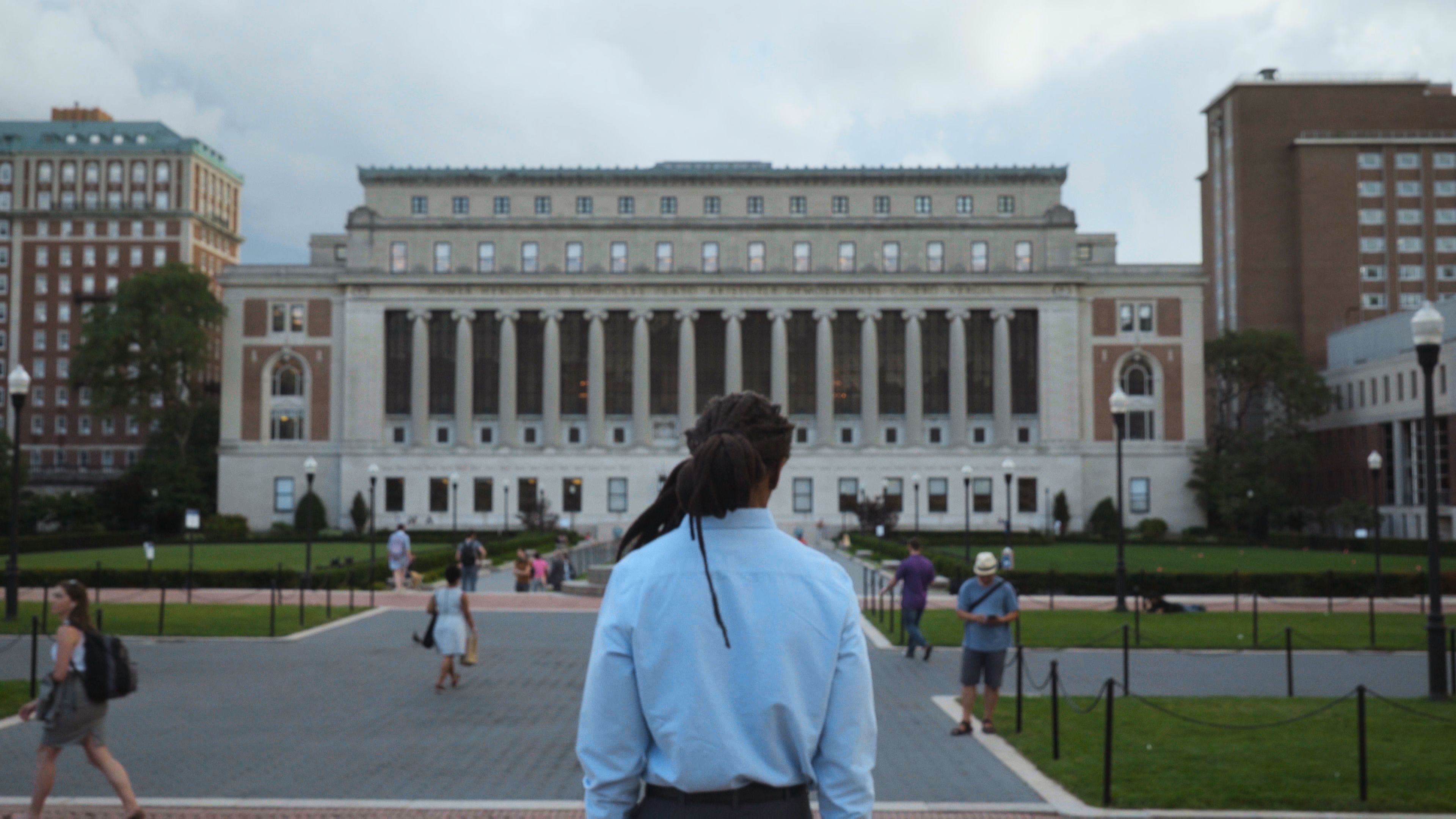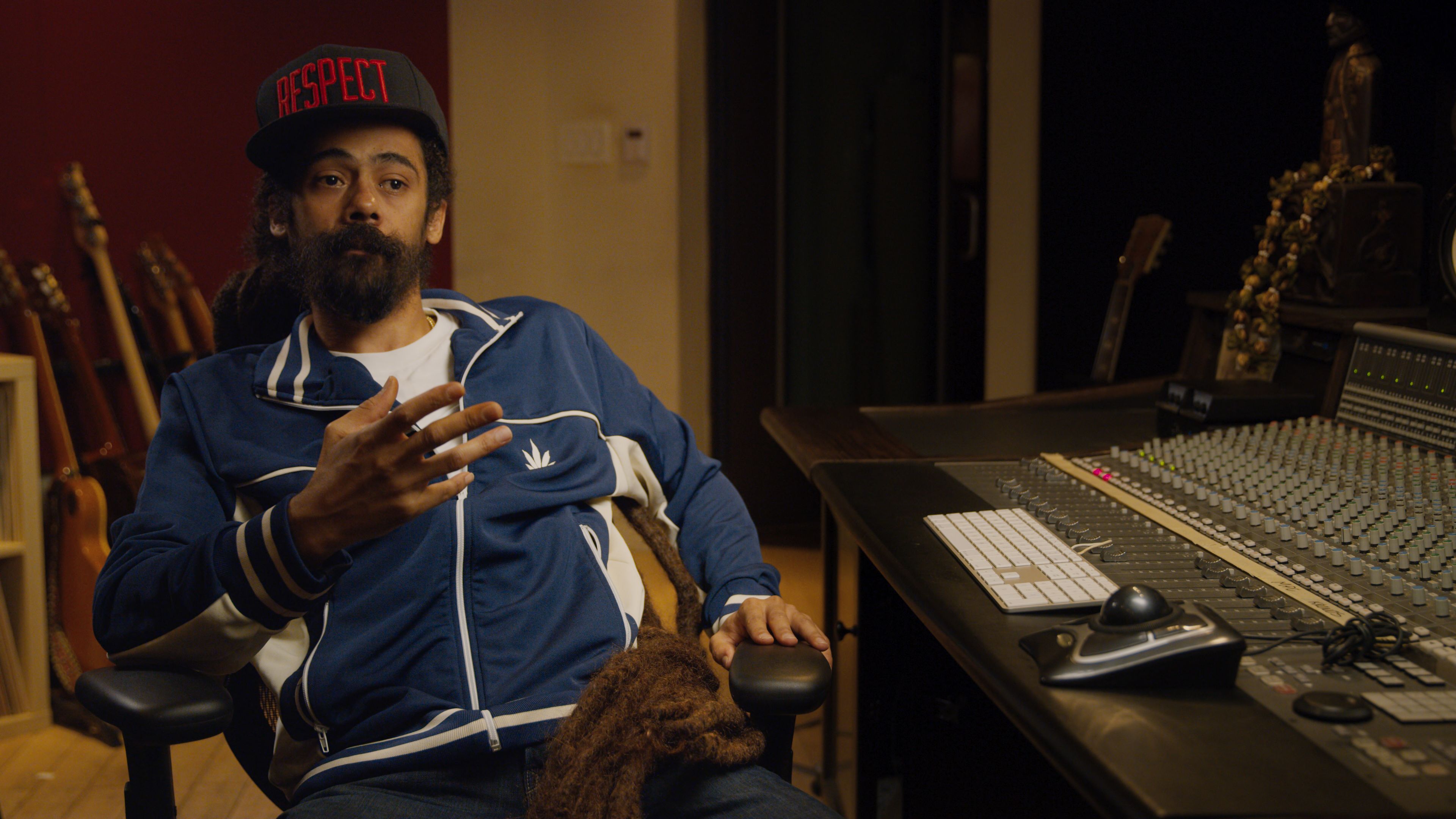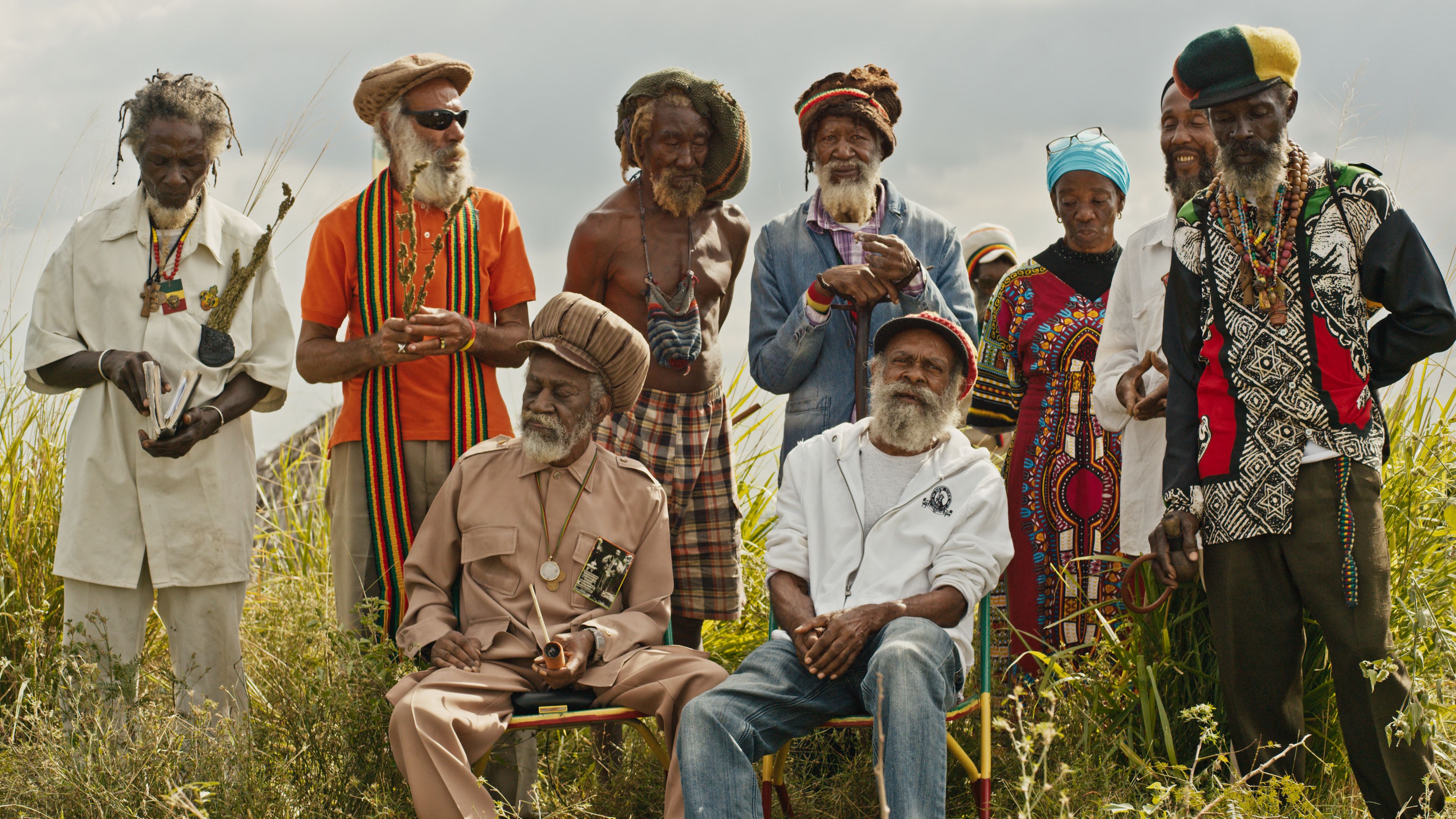Fab 5 Freddy, aka Fred Brathwaite, already has enough cultural clout to last five lifetimes. Though best known as the host of MTV’s groundbreaking Yo! MTV Raps program in the late ‘80s and early ‘90s, Freddy achieved earlier notoriety for his Warhol-inspired Campbell’s Soup subway mural, his bridging of NYC’s uptown hip-hop and downtown art-punk scenes, his starring role in the iconic film Wild Style, his friendship with Basquiat, and, of course, having his name dropped in Blondie’s “Rapture.” Oh yeah, he also directed music videos for songs from Nas and Snoop Dogg’s respective debut albums.
But Freddy’s most recent venture might be his most impactful and long-lasting cultural contribution yet. This past Saturday (4/20, for all of you living under rocks), he released a Netflix documentary entitled Grass Is Greener, which initially bills itself as a window into the world of cannabis-fueled music, but ends up being much more.
The godson of legendary jazz drummer Max Roach, Fab 5 Freddy grew up among a rich jazz (and cannabis) tradition, and the film begins by cataloguing the genre’s early history with the herb. Weed might be more commonly associated with later scenes like psychedelic rock, reggae, and hip-hop, but during Grass Is Greener’s first half-hour, Fab 5 Freddy illustrates its importance in African-American music from the start of the 20th century.
Slowly mixing in surprising, sometimes utterly terrifying details about the criminalization of cannabis (which didn’t happen nationally until 1937, years after some of the early jazz discussed), Fab 5 Freddy uses the popular world of pot-fueled music as a jumping off point for a much more somber discussion of racial inequity.
Alongside early advocates like Louis Armstrong and Cab Calloway, we’re introduced to cannabis prohibition villains like Harry Anslinger, the first commissioner of the Federal Bureau of Narcotics. Anslinger was instrumental in creating the scientifically inaccurate, hysterical image of “reefer madness.” By using expertly-researched evidence from both cultural and political archives, Freddy proves beyond the shadow of a doubt that cannabis criminalization has been inextricable from racist politics since day one.

If you go in expecting a lighthearted romp, Grass Is Greener might harsh your mellow. The doc confronts the viewer with the brutal realities and still-gestating effects of the War On Drugs, illustrating how cannabis has been used as a scapegoat in a number of prominent modern civil rights cases. But this is the history we should consider when talking about the celebration and legalization of cannabis.
Featuring interviews with Snoop Dogg, Cypress Hill, pioneering High Times editor Steven Hagar, and other prominent cannabis-focused members of the music, medical, commercial, and activist fields, the film presents a concise and compelling argument for cannabis clemency and decriminalization, as well as for inclusiveness for people of color in the newly legal industry. MERRY JANE caught up with Fab 5 Freddy over the phone to uncover the film’s origins, parse out its overall message, and laugh about its most unexpected moments.
(1).jpg)
MERRY JANE: How did the idea for Grass Is Greener first come to you?
Fab 5 Freddy: The idea hit me when I was having a conversation with a buddy, who had been in the underground cannabis business for a while, been incarcerated a couple of times. He was ready to try to make a move into the legal aspects of the business, but unfortunately, people that have prior [convictions] often times can't work in the business at all. So his idea was coming up with a consultancy company called 40 Acres and a Greenhouse, an allusion to the "40 acres and a mule" black folks were promised after slavery. That sparked a whole interesting conversation about people of color getting involved in the business, the hurdles that were set up to keep them out, and how he was going to find a cool work-around.
Then I began to think about the numerous songs about the plant from the jazz era all the way to hip-hop acts that were introduced on my show back in the Yo! MTV Raps era. I was like, 'Wait a minute, music has been out front popularizing the plant and the idea of cannabis since the '20s and '30s.' I just saw this continuum and a way to incorporate music to tell the story, and then jump off to different conversations about criminalization and social justice that we need to have.
Why did you decide to start with more music-related, upbeat stuff before getting into the second half of the film, which has a more somber tone?
It was just the way that hit me to tell the story. It shows what the people who created America's music were doing and thinking. Think of some of the plant’s medical benefits that are confirmed: we have vets coming home from Iraq with PTSD, committing suicide on a regular basis, sadly. Opioids are the pharmaceuticals used to treat PTSD, but there are confirmed reports of people saying they get better relief from using cannabis products.
So back in the '20s, when a black man couldn't really go to a hospital or a doctor most of the time, you had to have some home remedies. Guess what one of those remedies likely was? And think of musicians: you're not going to be able to do all of that important stuff on your instrument if you're drunk, but cannabis, in a sense, slows time down. That's perfect for the improvisational aspects of jazz music. Louis Armstrong, the progenitor of jazz, was a cannabis aficionado.
We pitched this as a multi-part [series], as well as a feature. If it had been the former, I would've delved into way more music — more rock, more reggae, even R&B, like Rick James' song "Mary Jane," or D'Angelo's "Brown Sugar,” and I wanted to interview George Clinton. It was just fascinating, all of the cutting-edge music people that really set the tone, set the trend, and helped spread the word.

I actually wrote a column about the earliest cannabis references in music a couple of years ago—
What did you find?
I found a version of the song "La Cucaracha" that dated back to the very early 1900s.
Yes! Yes! Yes! I found a clip from an old film from the '20s or '30s where they did a whole cannabis-related production of that song. We were digging up so many old songs, it was fascinating. Someone just sent me a link that listed all these products from that era that had cannabis in them. I'm sure you know there were numerous products that had cocaine or opium in them back then, but there were also plenty with cannabis listed clearly, to cure what ails you.
It's no secret, but when racists saw that it was bringing people together to hear this music, to pass that joint in between people, they wanted to do whatever it took to stop this. So Harry Anslinger created this whole campaign to tell people that it'll drive you criminally insane.
It was the "Reefer Madness" era, which we still live in. In the film, we show the role of cannabis in the defense of George Zimmerman's murder of Trayvon Martin, in the case of Sandra Bland, Mike Brown — even Botham Jean, where the cop went into the wrong apartment and killed this guy — 'Oh, he's got cannabis so that makes him a criminal.' That was fascinating, shocking to learn. This is stuff that people need to know about.
So when 4/20 comes around and people light up a fat one and have a good time while watching the movie, you're gonna be confronted with the reality, and that's not always the great time that you think it is. Social justice needs to be a part of cannabis legalization, because it'll be the same rich white guys getting all the money. Those that pioneered this shit on the street level, who went out there and risked their necks to feed their families to give us this harmless plant, they need to be at that table.

I want to get back to the modern industry in a second, but you mentioned Harry Anslinger. There's this moment in the film when the camera cuts to your face when you’re watching him talk about the cannabis “problem” in cities like New York, Philadelphia, Pittsburgh, Detroit, Chicago, New Orleans, and contrasting them with New England. Total racist dog whistle. What was running through your mind in that moment?
What was running through my mind was, 'You ain't slick, motherfucker' [laughs]. We see what's going on. Harry Anslinger's the person who killed Billie Holiday. Everybody knew she was a heroin addict, and he had her arrested, handcuffed to the bed without methadone, and she died handcuffed to that bed. In the longer version, I would've touched on that.
On the other side of the fence, it was cool to learn about Allen Ginsberg’s activism on this subject, how he called criminalization a “method of assault” on people of color. Was he the earliest active protestor of cannabis law’s inherent racism, or did you find others in your research?
He was, actually. He really took it mainstream, along with the whole '60s cultural revolution. My guy George Nelson Preston, who was on that scene, he's in the film reading an article from The Atlantic that Ginsberg wrote, and it just said so much. It really shined a light on what was happening. We all learn from each other, but it's just not as widely reported because of the racism pandemic in this country.
Knowing what I do about the Nixon administration, I suppose it shouldn’t have shocked me to hear him call criminalization a “tool to repress dissent,” or explicitly talking about disrupting racial and political communities, but it still did. All the while, though, I was thinking that it wouldn’t shock me at all to hear Trump say those things, too.
That's true.
What does that say about where we’re at now with the War on Drugs?
It's horrible. Before he got fired, we had Jeff Sessions in the film making a 100 percent Harry Anslinger-level comment in front of Congress about the plant — I'm sure you all saw it. But he's not an issue anymore. We've got other things to deal with, so that got cut out of the movie. But there's still people in the administration that have that level of ignorance. Once again, it's purely racist. There's no way you can tell me you believe all that if you're not trying to find a way to criminalize black folks. We've got to fight it, and when the opportunity comes, in whatever place it is, we've got to let our opinions be heard and let our representatives know that we're not supporting legalization unless there's equitable treatment of those most victimized.
.jpeg)
You caught two or three white cannabis entrepreneurs saying some wild, borderline racist stuff at a cannabis conference towards the end of the film. What about their words do you think exemplifies what’s wrong with the current cannabis industry?
I don't think there's any problem with people making money in this space. I think it's great. I just think it needs to be equitable. So those [white] guys are doing what they're doing, but when you see those black girls [in the film] talking about the high bar of entry into the industry — you've gotta have $200k to even get a license — that's that bullshit that's going down that's designed to keep people of color out of the business, bottom line. You can look at the economics and see the reality. So the New York State legislature is trying to put the [legalization] vote together by June, but if they don't get a bill that addresses these issues, they're not going to let it pass. I went up to Albany and showed my film to about 50 representatives last week, and they said this has solidified their position.
You’ve got a ton of iconic cannabis-referencing songs in the film. Was it difficult to acquire the rights to all of them, or were most artists and estates willing once they heard about the project?
We had to ‘fair use’ a lot of these songs, that means we can only use a really small portion, put text on the screen, do a lot of things that people thought were intentional, but our legal department was right there telling us the fair use rules. All the music that follows an actual song, like when it cuts to a person getting interviewed, the music in the background is all new music created by my cousin [and veteran music producer] Salaam Remi. That's from the jazz stuff all the way to hip-hop. We could only use the real songs for a few seconds, and then we have something comparable, but original, that plays under the interviews that follow. We could've never afforded to use the actual songs.
I was surprised to learn that Run-DMC's "Rock Box" was originally about weed.
C'mon man, my jaw was on the floor when they told me that. I was like, 'Really, dude? Amazing.'
So you were surprised by that, as well?
Unbelievably. That was one of those great moments that happened while the camera was rolling, like, 'Am I really getting this?'
I figured if anyone knew it'd be you.
Right? And then even Snoop really explaining how he came up with the title for The Chronic. You know, I directed his first video, he debuted on Yo! MTV Raps, and I spent a whole summer living in Dre's house. That was one of the defining scenes in the documentary, him explaining how that happened. I was smoking with Tha Dogg Pound on the regular, and Dre would rarely smoke, he was not a smoker like Snoop was. So it was interesting, this guy's got a record called The Chronic, like, the great weed album, and for Snoop to break that down, it made perfect sense.
Yeah, Dre named it that even though a few years prior on an N.W.A. song, he said that cannabis gives you brain damage.
That's right. That's a good example of what cannabis propaganda can do. What Dre said in that song, that's exactly what those early pot stories were saying, doctors saying that it gives you incurable brain damage. That's where that came from. That's the good job Harry Anslinger did. If you heard that shit from seemingly reputable people in lab coats, what are you gonna do? Thank god that Snoop woke Dre up.
“Grass Is Greener” is out now on Netflix — watch the full doc here
Follow Patrick Lyons on Twitter
http://bit.ly/2I68Fi3 April 23, 2019 at 02:29PM, 420GrowLife, KahliBuds Reviewed by GrowLife420
on
April 23, 2019
Rating:
Reviewed by GrowLife420
on
April 23, 2019
Rating:



No comments: